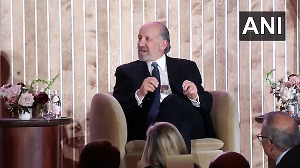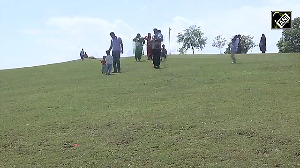Every afternoon, veiled young women from a squalid Muslim quarter in Kolkata walk to a public park where they swap their traditional attire for T-shirts, shorts and boxing gloves.
For two hours, they sweat it out in a makeshift boxing ring with just a metal sheet for a roof, often to the amusement of passers-by and children playing nearby.
Inspired by American champion Laila Ali, daughter of Muhammad Ali, many of them see boxing as a way to escape poverty and rigid social barriers in a country where women often have few career opportunities.
Women boxers have already made an impact on India, a cricket-mad country starved of major sporting success after winning just one medal in each of the last three Olympics. Light-flyweight Hmangte Marykom won a world boxing championship in 2003.
"We realise we have taken up a sport which is uncharted territory for women, more so for Muslim girls in India," 24-year-old Razia Shabnam said.
Despite stiff family opposition, Shabnam was one of the first from her neighbourhood to take up boxing. She is now a coach and international referee.
The young women now trying to emulate Shabnam come from Kolkata's Kidderpore district, a shanty town by the river Ganges dotted with gambling dens, brothels and illicit liquor sellers.
PARENTAL PERMISSION
The Kidderpore women were drawn to boxing after watching local young men in action, including Mohammed Ali Qamar, who won a light-flyweight gold medal at the 2002 Commonwealth Games.
"When we watched the boys we felt we too could do it," said 20-year-old Noor Afroz. "But getting our parents to agree was unimaginable."
Usually it is poor girls from rural areas who take up boxing in India, but Shabnam's father Rahat Hussain said: "She was absolutely adamant and I had to relent. In our society, girls taking to boxing is unknown."
Her persistence has helped others girls in her neighbourhood.
"When we saw her making it to the ring, it was easier for us to convince our parents," said 17-year-old Sanno Baby, who trains with twin sister Shakila at Shabnam's club.
"My mother didn't want us to fight because she was scared we would hurt our faces and no one would marry us," Shakila said.
"But I loved boxing too much to listen to her."
STRONG WOMEN
Boxing official Asit Banerjee encourages poor Muslim girls to join his club despite being branded by community leaders as an infidel who leads girls astray.
While it is unlikely to have much influence on attitudes in Kidderpore, Oscar-winning female boxing film "Million Dollar Baby" has proved inspirational for the women seeking acceptance in the sport.
"Their time will come," Banerjee said. "Then they will be the Million Dollar Babies."
"My mission is to bring a psychological and physiological change in the lives of these girls and eventually make them strong women and strong mothers."
Most of his 20-odd trainees come from large families who live in cramped, one-room quarters with common toilets and no running water. The park where they train doubles as a garbage dump.
They must also endure snide remarks about women's boxing, though they seem unfazed by it all, and very committed to their sport.
"Boxing is life for me. It has brought me recognition and given me a purpose in life," Afroz said. "Take it away and I'll be dead."
(Reuters)








